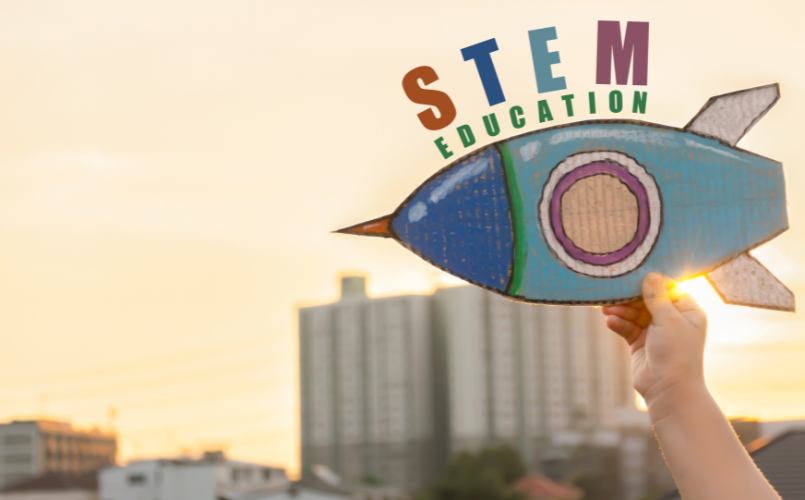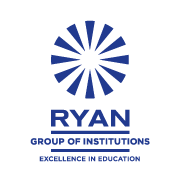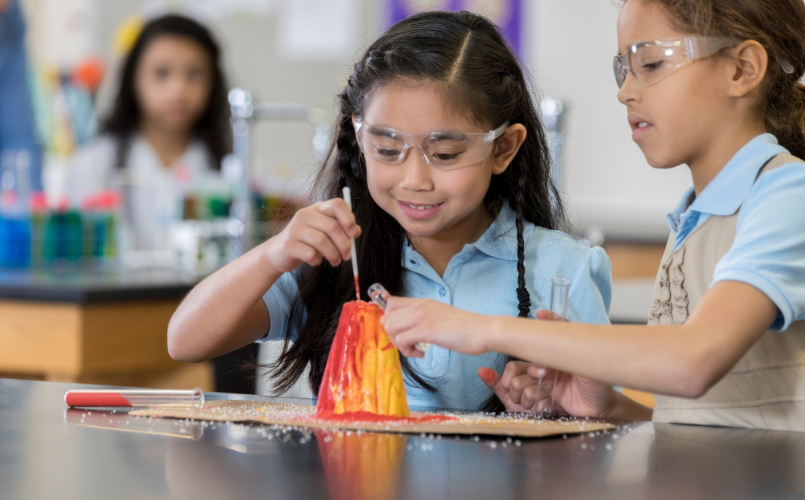Educational standards are evolving across the world, globalization is also creating standardization in education with exchange of ideas and practices. The focus on STEM subjects has gained unprecedented momentum. This emphasis stems from a global recognition of the pivotal role these fields play in driving innovation and economic growth. As we movw forward into the 21st century, proficiency in STEM is increasingly viewed as a cornerstone for students to thrive in a technology-driven world.
However, paralleling this STEM-centric narrative is the rising acknowledgment of the indispensable role of soft skills. Skills like effective communication, adept teamwork, proficient problem-solving, and efficient conflict resolution are emerging as critical additions to technical know-how. These human-centric skills, often immune to automation & artificial intelligence, are proving to be vital in maneuvering the complexities of today’s workforce. The juxtaposition of STEM and soft skills underscores a compelling truth: while technical acumen widens the arena, it’s the soft skills that enable one to excel within and beyond those doors.
As educators and policymakers in India and around the world grapple with the challenges of preparing students for an uncertain future, the amalgamation of STEM education with a strong foundation in soft skills presents a holistic approach. We seek to unravel the symbiotic relationship between these two domains and underscore their combined significance in shaping well-rounded, future-ready individuals.
The future doesn’t belong solely to those who can code or calculate; it belongs to those who can blend technical prowess with human empathy and understanding.
The Rise of STEM Education

In recent years, India’s educational focus has witnessed a significant shift towards STEM (Science, Technology, Engineering, Mathematics) disciplines. This shift is not just a local trend but a global movement, recognizing the central role of these subjects in shaping the future. From pioneering technological advancements to addressing critical environmental issues, STEM fields are at the forefront of societal progression.
Historically, India has always valued education, with a particular reverence for science and mathematics. This respect has evolved into a more structured emphasis on STEM education, spurred by the digital revolution and the country’s ambition to become a global technological powerhouse. Government initiatives and educational reforms have further catalyzed this focus, aiming to equip the next generation with the skills necessary to navigate and contribute to a technology-centric world.
The demand for STEM skills in the job market is another driving force behind this educational shift. Employers today are not just looking for candidates with degrees; they’re seeking individuals with a robust understanding of technology and its applications. This need is reflected in the growing number of career opportunities in the fields of data science, robotics, renewable energy and more. A recent study by NASSCOM highlights an increasing demand for professionals with expertise in emerging technologies across various sectors.
Furthermore, STEM education is not just about securing lucrative careers; it’s about cultivating a mindset of innovation and problem-solving. India’s strides in space exploration & IT are testaments to the power of STEM education in fostering innovation. The success stories of ISRO’s Mars Orbiter Mission and the nation’s booming IT sector illustrate how STEM education can propel a country onto the global stage.
It will be appropriate to state that the ascent of STEM education in India is a response to the demands of a rapidly changing world. It represents a strategic investment in the nation’s future, equipping young minds with the technical skills needed to drive progress and innovation. However, the mastery of STEM is only one side of the coin; the other is the cultivation of soft skills essential for holistic development.
Understanding Soft Skills

While the prowess in STEM is undeniably important, the role of soft skills in professional & personal development is equally crucial. Soft skills, often referred to as “people skills” or “interpersonal skills,” encompass a range of abilities that enable individuals to embrace their environment, work well with others, perform well, and achieve their goals with complementing skills.
Communication is a fundamental soft skill. It’s not just about conveying information; it’s about expressing ideas clearly, listening actively, and understanding the nuances of body language and tone. In a world where collaboration is key, the ability to communicate effectively can make or break a team’s success.
Teamwork is another vital soft skill. The ability to work collaboratively, respecting and valuing the contributions of others, is essential in most modern workplaces. Teamwork fosters a sense of community and collective responsibility, driving towards common goals.
Problem-solving is a skill that transcends job descriptions. The ability to approach challenges creatively, think critically, and find solutions is invaluable in any field. It’s not just about finding answers; it’s about being able to evaluate options, weigh the pros and cons, and make informed decisions.
Conflict resolution, too, is an integral part of professional life. The ability to face disagreements, understand different perspectives, and arrive at a mutually beneficial resolution is a skill that enhances the work environment and contributes to organizational success.
The importance of these soft skills is increasingly recognized in the global workforce. According to the World Economic Forum, skills like complex problem-solving, critical thinking, and creativity will be in high demand in the years to come. The LinkedIn Global Talent Trends report also highlights soft skills as crucial for business success.
In the Indian context, where the workforce is diverse and dynamic, these skills are especially significant. They enable professionals to adapt in a multicultural environment, collaborate effectively, and lead with empathy and understanding.
While STEM education equips students with the technical skills needed to enter the workforce, soft skills ensure they can navigate, contribute to, and excel in their professional environments.
The Synergy of STEM and Soft Skills
The convergence of STEM education and soft skills forms a potent combination, essential for success in today’s complex, fast-paced world. This synergy enables individuals to not only excel in their technical roles but also to navigate the intricacies of the workplace and society effectively.
In practical terms, the blend of STEM and soft skills can be seen in various professional scenarios. For example, a software engineer must possess the technical know-how to write code (a STEM skill) but also needs the ability to work as part of a team, communicate effectively with colleagues, and perhaps even manage conflicts (soft skills). Similarly, a scientist or a researcher needs to be adept at problem-solving and critical thinking but also requires the ability to present findings persuasively and collaborate with peers.
The real-world impact of this combination is substantial. As in the case of a tech startup: while technical skills are crucial for developing the product, soft skills are equally important for pitching ideas to investors, building customer relationships, and leading a diverse team. Many successful entrepreneurs attribute their success not just to their technical expertise but to their ability to inspire, lead, & communicate effectively.
Educators and industry experts increasingly advocate for a balanced approach in education that incorporates both STEM and soft skills. This approach prepares students not only for the technical demands of their future careers but also for the interpersonal dynamics of the workplace. For example, project-based learning, a popular educational approach, combines technical problem-solving with collaborative teamwork, thus bettering both sets of skills.
In India, where the workforce is rapidly adapting to global standards, this synergy is becoming increasingly critical. Indian companies and educational institutions are recognizing the need for professionals who are technically proficient & adept in soft skills, as evidenced by the evolving curriculum and training programs.
In this era where technology and human interaction are intertwined, the fusion of STEM skills with soft skills is not just desirable – it’s essential. It’s this blend that will empower the next generation of professionals to innovate, collaborate, and lead effectively in a diverse and dynamic world.
Preparing Students for the Future: A Dual Focus on STEM and Soft Skills
As we navigate through the evolving educational and professional landscape, the responsibility falls on educators and institutions to prepare students for the future. Achieving this balance is crucial for developing well-rounded individuals capable of thriving in a dynamic, interconnected world.
One effective strategy for educators is to integrate soft skills training into the STEM curriculum. This can be achieved through collaborative projects, where students not only apply their technical knowledge but also work in teams, communicate ideas, and resolve conflicts. Group science projects or robotics competitions can be excellent platforms for students to hone both sets of skills simultaneously.
Extracurricular activities also play a vital role in developing soft skills. Activities like debating, theater, sports, and student-led clubs provide invaluable opportunities for students to practice communication, leadership, teamwork, & problem-solving in real-world scenarios. These activities complement academic learning and contribute to the holistic development of students.
Real-world experiences are another crucial element. Internships, field trips, and industry interactions expose students to professional environments where they can apply their STEM knowledge and observe the importance of soft skills firsthand. These experiences bridge the gap between theoretical knowledge and practical application, giving students a taste of what awaits them in the workforce.
In addition, digital tools and platforms can be leveraged to enhance both STEM and soft skill learning. Online courses, interactive simulations, and collaborative platforms offer diverse, flexible learning experiences that cater to various learning styles & preferences.
As we conclude this discussion, the future demands individuals who are not only technically proficient but also adept in interpersonal skills. By cultivating a balanced approach to education, we equip our students with the tools they need to navigate the complexities of the modern world. As educators and guardians of the next generation’s potential, it’s our responsibility to ensure that students are not just competent in STEM but are also empathetic, communicative, and collaborative – qualities that truly define success in today’s interconnected world.




